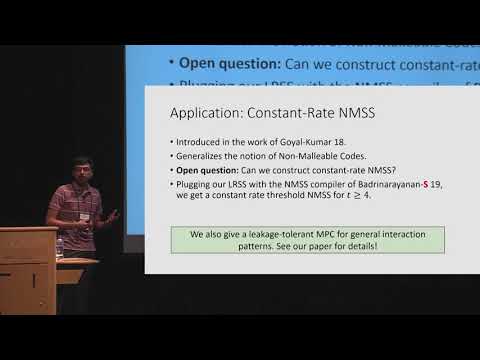CryptoDB
Leakage Resilient Secret Sharing and Applications
| Authors: | |
|---|---|
| Download: |
|
| Abstract: | A secret sharing scheme allows a dealer to share a secret among a set of n parties such that any authorized subset of the parties can recover the secret, while any unauthorized subset learns no information about the secret. A leakage-resilient secret sharing scheme (introduced in independent works by Goyal and Kumar, STOC ’18 and Benhamouda, Degwekar, Ishai and Rabin, CRYPTO ’18) additionally requires the secrecy to hold against every unauthorized set of parties even if they obtain some bounded leakage from every other share. The leakage is said to be local if it is computed independently for each share. So far, the only known constructions of local leakage resilient secret sharing schemes are for threshold access structures for very low (O(1)) or very high ( $$n -o(\log n)$$ ) thresholds.In this work, we give a compiler that takes a secret sharing scheme for any monotone access structure and produces a local leakage resilient secret sharing scheme for the same access structure, with only a constant-factor asymptotic blow-up in the sizes of the shares. Furthermore, the resultant secret sharing scheme has optimal leakage-resilience rate, i.e., the ratio between the leakage tolerated and the size of each share can be made arbitrarily close to 1. Using this secret sharing scheme as the main building block, we obtain the following results:Rate Preserving Non-Malleable Secret Sharing. We give a compiler that takes any secret sharing scheme for a 4-monotone access structure (A 4-monotone access structure has the property that any authorized set has size at least 4.) with rate R and converts it into a non-malleable secret sharing scheme for the same access structure with rate $$\varOmega (R)$$ . The previous such non-zero rate construction (Badrinarayanan and Srinivasan, EUROCRYPT ’19) achieved a rate of $$\varTheta (R/{t_{\max }\log ^2 n})$$ , where $$t_{\max }$$ is the maximum size of any minimal set in the access structure. As a special case, for any threshold $$t \ge 4$$ and an arbitrary $$n \ge t$$ , we get the first constant-rate construction of t-out-of-n non-malleable secret sharing.Leakage-Tolerant Multiparty Computation for General Interaction Patterns. For any function f, we give a reduction from constructing a leakage-tolerant secure multi-party computation protocol for computing f that obeys any given interaction pattern to constructing a secure (but not necessarily leakage-tolerant) protocol for a related function that obeys the star interaction pattern. Together with the known results for the star interaction pattern, this gives leakage tolerant MPC for any interaction pattern with statistical/computational security. This improves upon the result of (Halevi et al., ITCS 2016), who presented such a reduction in a leak-free environment. |
Video from CRYPTO 2019
BibTeX
@article{crypto-2019-29896,
title={Leakage Resilient Secret Sharing and Applications},
booktitle={Advances in Cryptology – CRYPTO 2019},
series={Lecture Notes in Computer Science},
publisher={Springer},
volume={11693},
pages={480-509},
doi={10.1007/978-3-030-26951-7_17},
author={Akshayaram Srinivasan and Prashant Nalini Vasudevan},
year=2019
}

